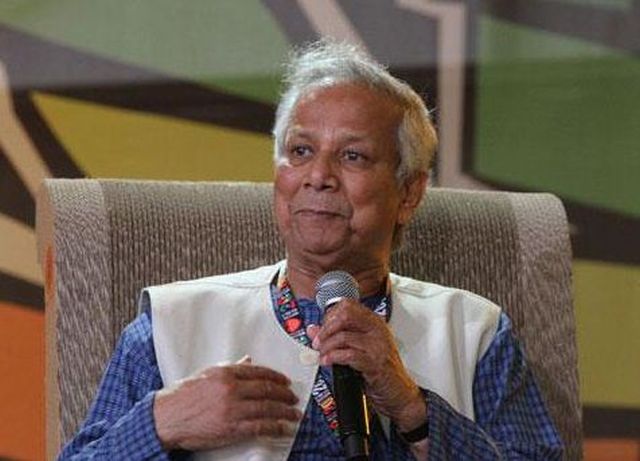
by admin | May 25, 2021 | Business Summit, Entrepreneurship, Events, Markets, Social Entrepreneur, Technology

Nobel laureate Muhammad Yunus
Bengaluru : Expressing apprehension that disruptive technology would hasten extinction of humankind, Nobel laureate Muhammad Yunus on Thursday warned companies against excessive use of Artificial Intelligence (AI).
“Technology will expedite our extinction on the planet Earth. It may sound funny because technology is supposed to help us and make things easier. But the way AI is invading the world, it will soon replace us with machines to do our job,” Yunus said at the eighth edition of Social Business Day here.
The Bangladeshi won the Nobel Peace Prize in 2006 for his effort to fight poverty. Yunus founded Grameen Bank which gives microcredit to the poor without any collateral.
Organised by the Yunus Centre, a Dhaka, Bangaldesh-based think tank founded by Yunus himself, the event had participants from 42 countries including Afghanistan, Australia, Canada, Italy, France, Taiwan and the US, among others.
As human beings can be replaced with machines, thereby saving money, more machines are being made in the world, leading to widespread use of AI, Yunus pointed.
“With the production cost using machines going down and profit margin going up, more machines are being made.”
In the process of adopting AI, several people will be pushed out of the jobs they hold, Yunus warned.
“We already have nearly 30-40 per cent of the youth remaining unemployed in several prosperous economies. And with the AI, people who are employed won’t have their jobs as smart machines are taking over,” the Nobel laureate said.
Technology, while being a blessing also has the potential to leave a human being at the mercy of others, creating a whole community of “beggars”, Yunus lamented.
“Human beings are capable of creating weapons of mass destruction in a smart way. We are capable of killing ourselves in a very decent way. That is the direction technology can go,” stressed the 78-year-old social entrepreneur.
Countries taking pride in their “fast-growing” economies must beware of concentration of wealth in their nations, Yunus said.
“We take pride that our economies are growing faster than anyone else’s but we forget that the faster we grow, the faster is the rate of wealth concentration and we soon approach the doomsday,” he added.
The two-day event which began on Thursday was held on the Infosys campus at the Electronics City in the southern outskirts of the city.
—IANS

by admin | May 25, 2021 | Opinions
 London,(IANS) A spurt in number of billionaires and increasing wealth creation by any means have made India rank ninth among the crony capitalist countries, said a study in “The Economist” latest issue.
London,(IANS) A spurt in number of billionaires and increasing wealth creation by any means have made India rank ninth among the crony capitalist countries, said a study in “The Economist” latest issue.
According to the weekly crony-capitalism index, crony fortunes had leapt relative to global GDP and as a share of total billionaire wealth.
“Encouragingly, India seems to be cleaning up its act. In 2008 crony wealth reached 18 percent of its GDP, putting it on a par with Russia. Today it stands at 3 percent of its GDP, a level similar to Australia,” the study revealed.
The non-crony sector wealth in India accounts for 8.3 percent of its GDP.
The index ranked Russia as the worst crony-capitalist country, followed by Malaysia, Philippines, Singapore, Ukraine, Mexico, Indonesia and Turkey above India. Taiwan and China are ranked 10th and 11th after India.
The magazine’s index of crony capitalists is based on a study by Ruchir Sharma of Morgan Stanley Investment Management and Aditi Gandhi and Michael Walton of Delhi’s Centre for Policy Research.
The index was designed in 2014 to test whether the world was experiencing a new era of arobber barons’ – a global re-run of Americas’s “gilded age” in the late 19th century.
“It may seem that this new golden era of crony capitalism is coming to a shabby end. In London, Vijay Mallya, a ponytailed Indian tycoon, is fighting deportation back to India as the authorities there rake over his collapsed empire,” the article said, in light of legal battles the liquor baron is facing back home.
Using data on billionaires’ fortunes from rankings by the US magazine Forbes, the article labelled each billionaire as a crony or not, based on the industry in which he is most active.
“The pin-ups of Indian capitalism are no longer the pampered scions of its business dynasties, but the hungry founders of Flipkart, an e-commerce firm,” the study said, referring to its co-founders Sachin Bansal and Binny Bansal figuring in the Forbes’ 2016 billionaires list, ranked jointly at 1,476 position.
Among the 22 countries in the updated index, Germany is the cleanest with least number of crony capitalists, ranking at the bottom of the index, while China has the biggest concentration of crony wealth in the world at $360 billion.
The study suggested that since globalisation had taken off in the 1990s, there had been a surge in billionaire wealth in industries that often involve cosy relations with the government, such as casinos, oil and construction.
Over two decades, crony fortunes had leapt relative to global GDP and as a share of total billionaire wealth.
“The economic climate has been tough on cronies, too. Commodity prices have tanked, cutting the value of mines, steel mills and oilfield concessions. Emerging-market currencies and shares have fallen. Asia’s long property boom has sputtered,” the study added.


